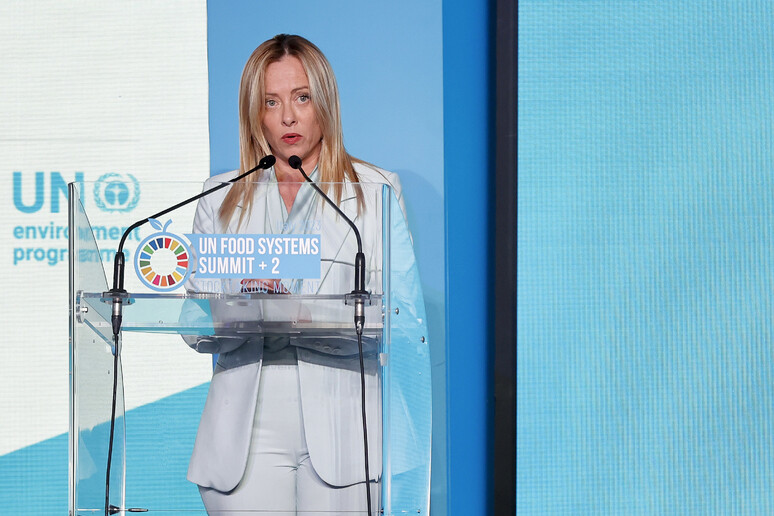The UN Food Systems Summit+2
Stocktaking Moment (UNFSS+2) kicked off on Monday at the Food
and Agriculture Organization of the United Nations (FAO)
headquarters in Rome with a high-level opening ceremony attended
by over 20 heads of State and Government, and a strong call for
accelerating action to transform global agrifood systems.
The three-day high-level event is convened by the United Nations
Secretariat and hosted by Italy, in collaboration with the
Rome-based UN Agencies (FAO, IFAD, WFP), with the objective of
taking stock of the progress achieved since the first UN Food
Systems Summit in 2021. The opening ceremony was led by the UN
Secretary-General, António Guterres, and the Prime Minister of
Italy, Giorgia Meloni.
In his opening speech, FAO Director-General, Qu Dongyu,
highlighted that the UN Food System Summit process has made it
clear that agrifood systems hold huge power and potential in
contributing to the achievement of the Sustainable Development
Goals.
He noted the progress achieved in identifying the solutions that
agrifood systems can provide for better production, better,
nutrition, a better environment and a better life— such as
sustainable farming practices, efficient water management,
responsible packaging, reforestation and reduced food waste—and
underlined that these depended on transforming global agrifood
systems to be more efficient, inclusive, resilient, and
sustainable.
"In the face of increasing uncertainties and multiple crises, we
need to urgently undertake this transformation to fulfil the
high expectations we have from our agrifood systems," he
underscored.
To speed up progress, he said, it is necessary to leverage
cross-cutting accelerators, and FAO is focusing on four key
areas: science and innovation, improved data capabilities,
increase in targeted and coordinated public and private finance,
and establishing inclusive agrifood systems governance
mechanisms.
"Unlocking the full potential of agrifood systems can only
happen if we focus on these accelerators, to help minimize
trade-offs and maximize synergies," Qu highlighted.
Healthy food for all
The UN Secretary-General António Guterres, as the convenor of
the event, delivered the keynote speech, also recognizing the
progress since the first UN Food Systems Summit in 2021.
"Over 100 countries have submitted voluntary progress reports on
food systems transformation. Countries are taking decisive steps
to reflect this priority in national and sub-national laws,
policies and programming," he noted, adding that there is also
progress on data to shape policies and partnerships.
However, he said, rescuing the Sustainable Development Goals
means going much further, and time is running out.
The UN chief asked for a massive investment in sustainable,
equitable, healthy and resilient food systems; for government
and businesses to work together to build systems that put people
over profit, and explore new ways to lower the cost and increase
the availability of healthy food for all; and to reduce food
systems carbon footprint to help end the "senseless" war on our
planet and limit global warming to 1.5 degrees Celsius.
"Let's keep holding each other to account and learning from one
another. Let's transform food systems for the future, and ensure
that every person, in every community and country, has access to
the safe and nutritious food they need and deserve," he urged
the Summit.
Italian Prime Minister, Georgia Meloni, officially inaugurated
the Summit with a welcoming message, saying that Rome will
become the Food Security Capital of the World for three days, a
choice "that pays tribute to Italy's traditional commitment to
this crucial issue".
"Food security has always been one of the strategic guidelines
of our foreign policy and a priority area of Italian development
cooperation. And it has become one of the major challenges of
our time, in a completely interconnected world,"she said,
inviting nations to invest in research and technology, finance
at scale, and cooperate to transform food systems.
Three days to convene
The opening ceremony also had the participation of Prime
Minister of Ethiopia Abiy Ahmed; Prime Minister of Bangladesh
Sheik Hasina; Primer Minister of Samoa Fiame Naomi Mataafa;
Prime Minister of Nepal Pushpa Kamal Dahal; President of Armenia
Vahagn Khachaturyan; Alvaro Lario, President of IFAD; Cindy
Mcain, WFP Executive Director; and Agnes Kalibata, President of
the Alliance for a Green Revolution in Africa (AGRA) and Former
Special Envoy for the 2021 Food Systems Summit.
The Summit will last until Wednesday 26 July and will see a
series of high-level events, dialogues and side events related
to transforming agrifood systems on topics such as food waste,
climate change, healthy diets, partnerships, science and
technology, indigenous people's knowledge, and transportation.
The high-level event comes at a time when up to 785 million
people are facing hunger globally, one-third of all food
produced is lost or wasted and more than three billion people
cannot afford healthy diets.
Unsustainable methods of producing, packaging, and consuming
food are also exacerbating the climate crisis by contributing to
one-third of all greenhouse gas emissions, utilizing 70 percent
of the world's freshwater, and causing extensive biodiversity
loss.
According to FAO Director-General, QU Dongyu, the Summit must
address the fact that agrifood systems need to be transformed so
that they can meet the increased demand for food while reducing
pressure on natural resources; reduce greenhouse gas emissions
and safeguard biodiversity; increase resilience to the climate
crisis, conflicts and other disruptions to supply chains; ensure
decent employment; and ensure access to safe and nutritious food
and healthy diets for all.
ALL RIGHTS RESERVED © Copyright ANSA











